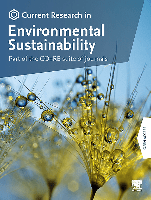
Current Research in Environmental Sustainability
Scope & Guideline
Leading the Charge in Environmental Science Innovation
Introduction
Aims and Scopes
- Interdisciplinary Research:
The journal encourages research that integrates multiple disciplines, including environmental science, sociology, economics, and policy studies to develop comprehensive solutions to sustainability challenges. - Empirical Studies:
A strong emphasis is placed on empirical analyses that provide data-driven insights into sustainability practices, impacts, and policies, often utilizing case studies from diverse geographical contexts. - Focus on Global and Local Contexts:
Research published in the journal addresses both global sustainability challenges and localized issues, thereby contributing to a broader understanding of environmental sustainability across different scales. - Stakeholder Engagement:
The journal emphasizes the importance of stakeholder engagement in sustainability research, often highlighting participatory approaches and co-production of knowledge between researchers and communities. - Innovative Solutions and Practices:
The journal is committed to exploring innovative practices and technologies that can enhance sustainability, including agroecological practices, sustainable resource management, and renewable energy solutions.
Trending and Emerging
- Water-Energy-Food Nexus:
There is a growing focus on the interconnectedness of water, energy, and food systems, emphasizing the need for integrated approaches to resource management that enhance sustainability and resilience. - Climate Change Adaptation and Resilience:
Research exploring adaptation strategies and resilience-building measures in the face of climate change is trending, particularly studies that investigate community-level responses and innovative practices. - Consumer Behavior and Sustainability:
An increasing number of studies are examining the role of consumer behavior in driving sustainability, including attitudes toward sustainable products and practices, as well as the implications for policy and market trends. - Social Equity and Environmental Justice:
Emerging themes include the intersection of social equity and environmental justice, highlighting the importance of inclusive approaches in sustainability research that address marginalized communities and their unique challenges. - Technological Innovations for Sustainability:
There is a notable rise in research focused on technological advancements that contribute to sustainability, including renewable energy technologies, waste management innovations, and precision agriculture.
Declining or Waning
- Traditional Agricultural Practices:
Research on conventional agricultural practices is decreasing as the focus shifts toward more sustainable and innovative agricultural methods, such as agroecology and climate-smart agriculture. - Single-Dimensional Environmental Policies:
There is a noticeable decline in studies solely focused on environmental policies without considering social and economic dimensions, as the journal increasingly promotes integrated approaches. - Local Case Studies without Broader Implications:
The publication of case studies that do not draw broader implications for sustainability trends or practices is diminishing, reflecting a shift toward research that connects local findings to global sustainability frameworks. - Limited Focus on Non-Human Stakeholders:
Research concentrating exclusively on human impacts is waning, as there is a growing recognition of the importance of non-human actors and ecological perspectives in sustainability discussions. - Narrowly Defined Sustainability Metrics:
Studies that rely solely on traditional metrics of sustainability without incorporating holistic or innovative assessment frameworks are becoming less prominent as researchers seek more comprehensive evaluation methods.
Similar Journals

Sustainability
Connecting Ideas for a Sustainable WorldSustainability is a leading open-access journal published by MDPI, dedicated to the interdisciplinary exploration of sustainability across diverse fields including environmental science, energy engineering, and social governance. Since its inception in 2009, this journal has steadily gained prominence, currently holding a significant Impact Factor and achieving notable rankings in various Scopus categories, such as Q1 in Geography, Planning and Development and Q2 in Energy Engineering and Power Technology. With its base in Switzerland, Sustainability fosters dialogues around pressing global issues and sustainable practices, making a substantial contribution to academia and industry alike. Researchers and professionals are encouraged to share innovative ideas and findings that advance the understanding of sustainability challenges and solutions. The journal's commitment to Open Access ensures that high-quality, peer-reviewed research is readily available to researchers, educators, and policymakers worldwide.

Discover Sustainability
Connecting research with real-world impact.Discover Sustainability is a prominent academic journal published by Springer Nature, dedicated to advancing knowledge in the fields of sustainability, energy, environmental science, and geography. Established in 2020, this Open Access journal aims to provide a platform for high-quality research that addresses pressing global challenges related to sustainable development. With an impressive Q2 ranking in various categories including Energy (miscellaneous), Environmental Science (miscellaneous), Geography, Planning and Development, and a respectable position in Renewable Energy, Sustainability and the Environment, it serves as a vital resource for researchers, professionals, and students alike. As the importance of sustainability initiatives continues to grow, Discover Sustainability offers a valuable repository of innovative ideas and empirical studies that contribute to the advancement of sustainable practices worldwide. Explore this journal to engage with groundbreaking research that shapes the future of our planet.
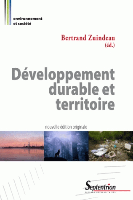
Developpement Durable & Territoires
Exploring the Intersection of Sustainability and TerritorialityDéveloppement Durable & Territoires is a premier open-access journal dedicated to fostering innovative research and discourse in the fields of sustainable development and territorial studies. Published by the RESEAU DEVELOPPEMENT DURABLE & TERRITOIRES FRAGILES, this journal serves as a vital platform for researchers, practitioners, and policymakers seeking to address the complex challenges posed by environmental sustainability and territorial management. Since its inception in 2002, it has committed to disseminating high-quality research that informs best practices and encourages interdisciplinary collaboration across various sectors. While it currently lacks a quantified impact factor and HIndex, its accessibility ensures a wide reach and engagement with contemporary thought leadership in sustainability. The journal is based in Villeneuve d'Ascq, France, and provides an essential resource for advancing knowledge in sustainable practices and insights into fragile territories.
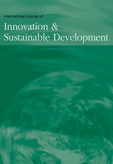
International Journal of Innovation and Sustainable Development
Exploring the Intersection of Innovation and Environmental StewardshipThe International Journal of Innovation and Sustainable Development, published by INDERSCIENCE ENTERPRISES LTD, is a pivotal platform for researchers, professionals, and students interested in areas such as management of technology and innovation, as well as renewable energy and sustainability. Since its inception in 2005, this journal has aimed to disseminate high-quality research that addresses the urgent challenges of innovation in the context of sustainability. Located in the United Kingdom with an outreach extending to a global audience, the journal features a diverse range of articles aimed at fostering interdisciplinary collaboration. With an increasing importance in today’s rapidly evolving societal and environmental landscape, this journal provides essential insights and advancements in its fields of study, which are crucial for informed decision-making and policy formulation. Although currently placed in the lower quartiles of its categories, the journal still plays an essential role in nurturing new ideas and facilitating discussions that can lead to impactful advancements in innovation and sustainability.
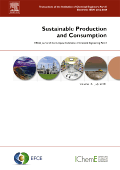
Sustainable Production and Consumption
Advancing the Future of Eco-Conscious PracticesWelcome to Sustainable Production and Consumption, a premier journal published by Elsevier in the vibrant field of sustainability and environmental science. With an ISSN of 2352-5509, this journal has established itself as a leading platform for innovative research and discourse on sustainable manufacturing, consumption practices, and environmental technologies. As evidenced by its impressive 2023 rankings—Q1 in Environmental Chemistry, Environmental Engineering, Industrial and Manufacturing Engineering, and Renewable Energy, Sustainability and the Environment—the journal ranks among the top tier of its field. Researchers and professionals alike are invited to explore the journal’s rigorous peer-reviewed articles, which aim to advance the understanding and implementation of sustainable practices across various industries. With a strong commitment to disseminating impactful research, Sustainable Production and Consumption serves as an essential resource for academics, policy makers, and industry leaders seeking to address the challenges of modern environmental sustainability.

Resources-Basel
Advancing sustainable practices in environmental science.Resources-Basel is a premier open access journal published by MDPI, specializing in the fields of environmental science, management, and landscape conservation. Since its inception in 2012, the journal has established itself as a reputable source of scholarly research and discourse, achieving notable rankings including Q2 in Management, Monitoring, Policy and Law and Q1 in Nature and Landscape Conservation as of 2023. With impressive Scopus rankings, including a 27th place in the category of Environmental Science focused on Nature and Landscape Conservation, and a 82nd in Management, Monitoring, Policy and Law, Resources-Basel plays a crucial role in advancing knowledge and best practices within these vital domains. Based in Basel, Switzerland, the journal embraces the open access model, ensuring that research is widely accessible to scholars, practitioners, and the public alike, catering to the pressing issues of sustainable resource management and environmental conservation. Researchers, professionals, and students are encouraged to engage with the latest findings published here, contributing to the global discourse on sustainable practices and policy innovation.
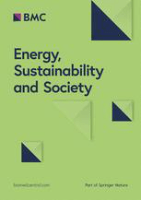
Energy Sustainability and Society
Shaping a sustainable tomorrow through open-access research.Energy Sustainability and Society is a leading open-access journal published by BMC, focusing on the critical intersections of energy sustainability and societal impacts. With an impressive Impact Factor and notable rankings—including Q1 in both Development and Energy Engineering, as well as Q2 in Renewable Energy, Sustainability, and the Environment—this journal serves as a pivotal platform for researchers, professionals, and students exploring innovative solutions to energy challenges. Since its inception in 2011, the journal has consistently provided high-quality research and insights, contributing significantly to the fields of energy policy, renewable technologies, and sustainable development. Access options are fully open-access, ensuring that research is freely available to foster collaboration and knowledge-sharing across disciplines. The journal’s commitment to publishing cutting-edge research underscores its importance in shaping a sustainable energy future.
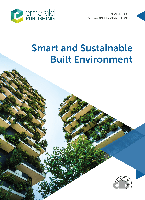
Smart and Sustainable Built Environment
Pioneering research for a sustainable built environment.Smart and Sustainable Built Environment, published by Emerald Group Publishing Ltd, is a prestigious journal dedicated to advancing the knowledge and practice of sustainable development within the landscape of modern architecture, building, and civil engineering. With an impact factor that reflects its strong influence and standing—illustrated by its consistent categorization in the Q1 tier across several relevant fields including Architecture, Building and Construction, and Urban Studies—this journal has become an essential resource for researchers, practitioners, and policymakers alike. Operating in the vibrant academic backdrop of the United Kingdom, it aims to publish cutting-edge research that addresses critical issues at the intersection of sustainability and built environments. The journal is also indexed in Scopus with impressive rankings, ensuring visibility and credibility. The scope of the journal encompasses a broad array of topics, encouraging contributions that discuss innovative practices, policies, and technologies to foster smart and sustainable development. With its dedication to publishing high-quality research from 2012 to 2024, Smart and Sustainable Built Environment is at the forefront of fostering dialogue and collaboration in the pursuit of sustainable solutions for our built environment.

Journal of Environmental Studies and Sciences
Exploring innovative solutions to environmental challenges.Journal of Environmental Studies and Sciences, published by SPRINGER, serves as a pivotal platform for advancing the field of environmental science and related disciplines. With an ISSN of 2190-6483 and E-ISSN of 2190-6491, this esteemed journal has established itself as a reputable source of knowledge since its inception in 2011. Covering an expansive range of topics related to environmental studies, the journal has achieved a commendable position within the academic community, evidenced by its 2023 category quartiles, ranking in the Q2 tier for both Environmental Science (miscellaneous) and Geography, Planning and Development. The journal's Scopus rankings further highlight its impact within the fields of Geography, Planning and Development, and General Environmental Science, boasting a respectable percentile rank of 69th and 58th respectively. Although it does not currently offer Open Access, the Journal of Environmental Studies and Sciences remains an essential resource for researchers, professionals, and students aiming to explore critical environmental issues, engage with innovative research, and contribute to sustainable development practices. Its ongoing commitment to academic rigor ensures that it continues to play a vital role in shaping the discourse around environmental challenges and solutions.
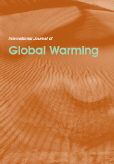
International Journal of Global Warming
Illuminating the Path to Environmental SustainabilityWelcome to the International Journal of Global Warming, a pioneering publication dedicated to advancing knowledge in the crucial fields of global warming, climate change, and environmental policy. Published by INDERSCIENCE ENTERPRISES LTD, this journal serves as an essential platform for interdisciplinary research, examining the multifaceted impacts of global temperature rises on our planet. Since its inception in 2009 and continuing through to 2024, the journal has fostered a vibrant scholarly community, despite currently being indexed in the Q4 quartile for Atmospheric Science and Global and Planetary Change. The journal's unique focus allows researchers, professionals, and students to engage with critical data and innovative methodologies in environmental management, monitoring, and legal policy responses. Submissions are invited from scholars worldwide, though the journal is not open access, ensuring a selective and quality-driven publication process. Beyond its academic contributions, the International Journal of Global Warming plays a significant role in shaping discussions about climate resilience and sustainability practices, making it a vital resource in today's pressing environmental discourse.